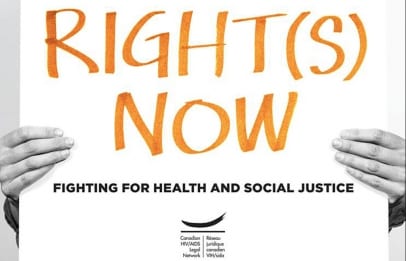Every December, we acknowledge World AIDS Day — a time to reflect on how HIV/AIDS has affected us, and the work that is needed to put an end to the virus.
The Canadian HIV/AIDS Legal Network released a briefing paper, “Action Required,” outlining steps the Canadian government needs to take in order to better address HIV. It points to five key areas that need to be addressed federally in order to meet the goal of ending HIV. Daily Xtra has published a condensed version below, but you can read the full paper here.

———————
Globally, we are starting to see significant progress in the effort to address HIV.
But none of these goals [are] possible unless governments are willing to protect and uphold human rights, especially those of the communities most affected by HIV
It is time for Canada to re-commit to the global project of ending HIV, including by basing our response on sound scientific evidence and fundamental human rights principles. There are immediate actions Canada’s federal government can and should take. We have identified the five priority issues — and associated government actions — to ensure a federal response to HIV that is effective because it is evidence-based and respects and promotes the human rights of all constituents.
Reinvigorate the federal response to HIV
Canada’s federal strategy on HIV and AIDS is now a decade old. It is not informed by the most recent scientific breakthroughs and has never been adequately funded.
Over the last eight years, more than $100 million of funds originally committed to the HIV response — and reflecting an all-party consensus — have simply never been delivered.
However, reinvigorating Canada’s response to HIV is about more than money. An effective federal HIV strategy must take into account the latest research and experience. Moreover, it must respond to the needs of the people and communities most affected, including by funding programs and services that accommodate the specific circumstances and systemic obstacles faced by those communities.
Promote harm reduction and reform drug policy
Canada’s recent record on drug policy is shockingly poor. In 2012, the Safe Streets and Communities Act implemented mandatory minimum sentencing for nonviolent drug offences, despite overwhelming international evidence that such measures are both ineffective and damaging. In 2015, the Respect for Communities Act targeted supervised consumption services (SCS), such as Vancouver’s Insite. SCS are proven to be effective in reducing risks of transmission of bloodborne diseases, such as HIV and hepatitis C, reducing deaths from overdose, and connecting people to other needed health services.
As the Supreme Court of Canada declared in its landmark ruling in 2011: “Insite saves lives. Its benefits have been proven.” Nevertheless, Bill C-2 imposed excessive and unreasonable obstacles for health authorities and community agencies seeking to provide these life-saving health services.
Defend the human rights of LGBTI people, domestically and globally
HIV does not discriminate based on sexual orientation or gender identity. It does, however, thrive in conditions of stigma and discrimination. Although significant progress, including legal protection against discrimination based on sexual orientation, has been made in Canada, the human rights of transgender people are still being violated.
Legal protection against discrimination and violence based on gender identity or expression is still incomplete under Canadian law, and little recognition exists of the rights of intersex people.
Protect sex workers’ rights
Sex work is work, and sex workers deserve the same protections in law as any worker, including support in protecting their health and safety. Sex workers are also important frontline allies in the prevention of HIV transmission. By criminalizing sex workers, their clients or their workplaces, governments are perpetuating human rights violations, endangering the health and safety of both sex workers and their clients, and exacerbating the HIV epidemic.
Bill C-36, misleadingly named the Protection of Communities and Exploited Persons Act, reintroduced many of the very harms the Supreme Court struck down as unconstitutional. In December 2015, this bill came into effect in Canada, again putting sex workers in harm’s way and disregarding their health and human rights.
Promote access to medicines
Equitable, universal access to prescription medicines remains elusive in Canada, with a patchwork of inadequate pharmacare coverage across the country. Laws and policies, including intellectual property rules in international trade agreements, are a significant part of the problem affecting access to medicines for HIV and other health needs.
The previous Parliament had before it Bill C-398, aimed at fixing the flaws in Canada’s Access to Medicines Regime (CAMR). Created with unanimous support in Parliament in 2004, CAMR was supposed to allow compulsory licensing of expensive, patented medicines to permit exports to developing countries of equivalent, lower-cost, generic versions. But more than a decade later, CAMR has not assisted countries in getting access to more affordable medicines.

 Why you can trust Xtra
Why you can trust Xtra


